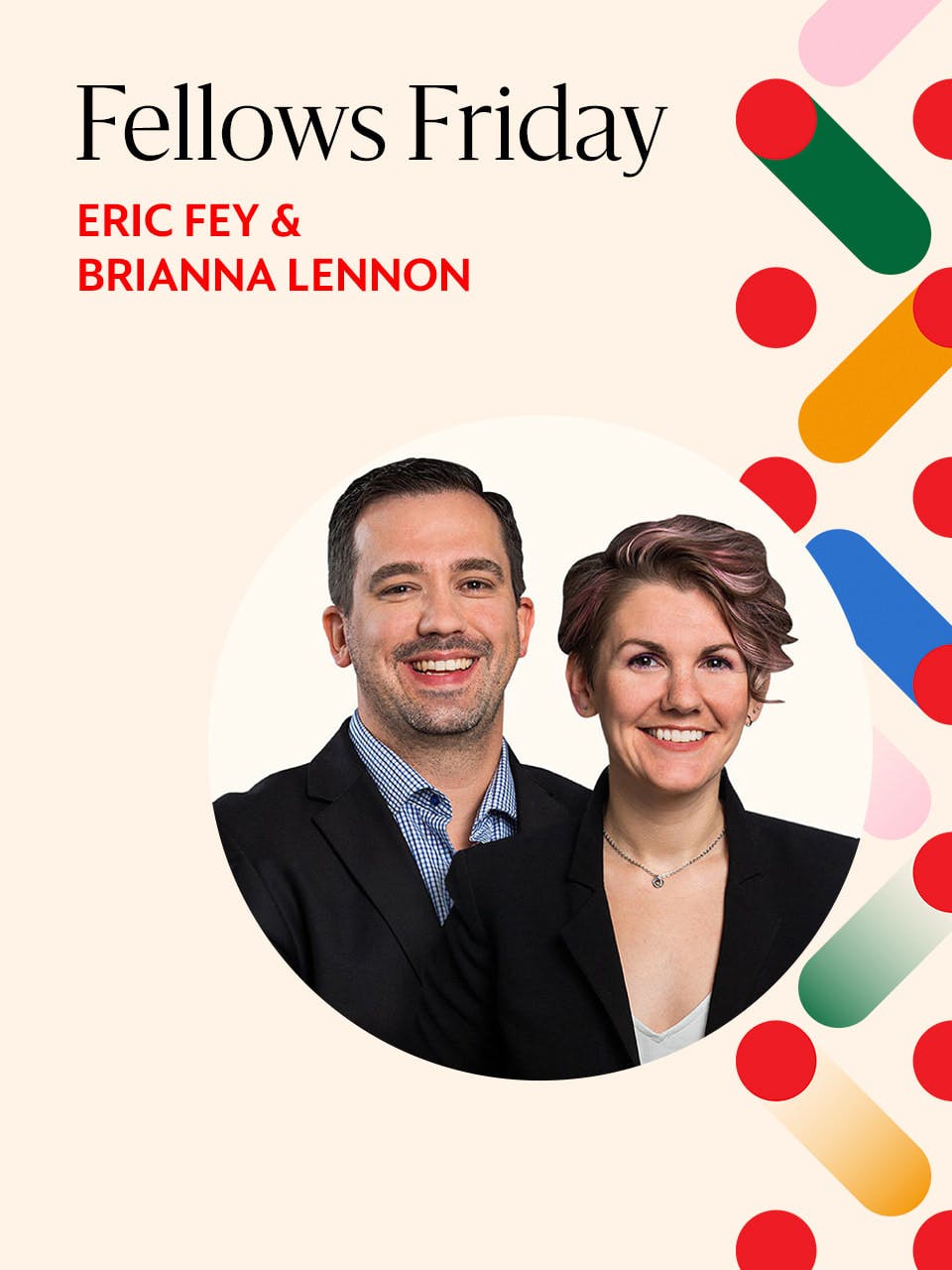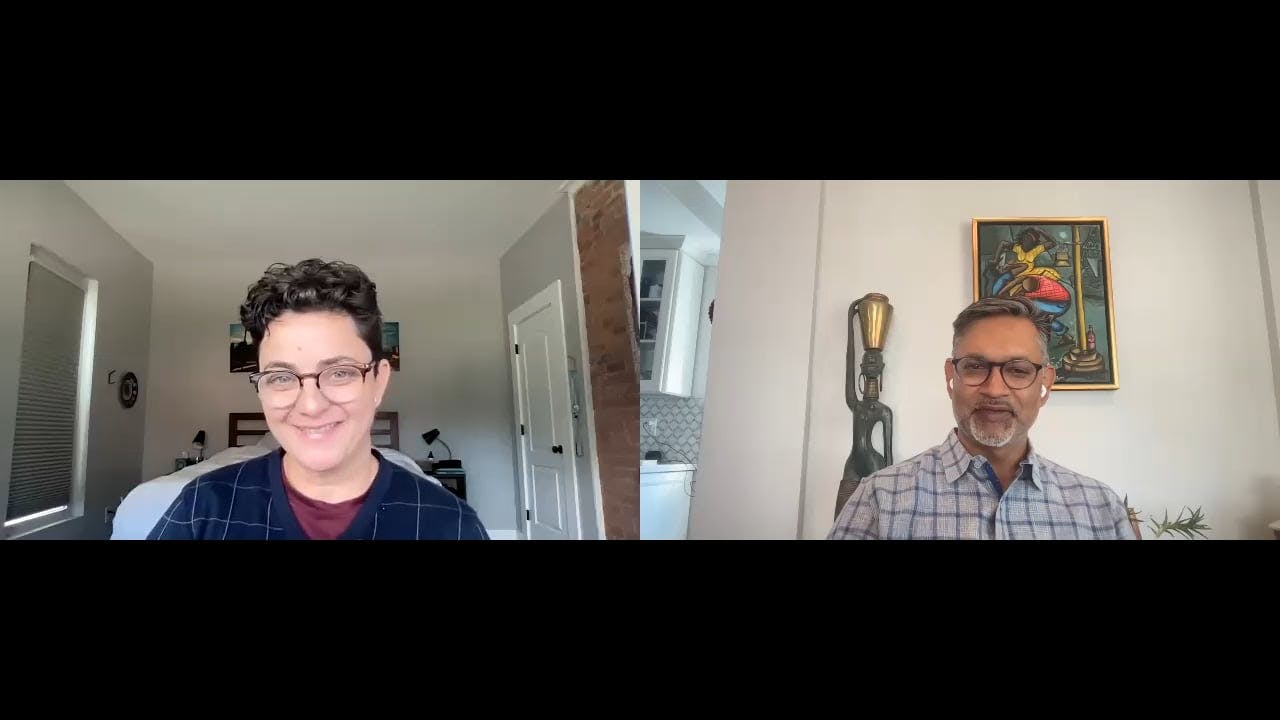
How local election officials make our democracy work
53 min watch
In 2019, Ali Noorani and Luma Mufleh started a conversation. Noorani, a son of Pakistani immigrants who then led the National Immigration Forum, and Mufleh, a refugee of Syrian descent who came to the U.S. from Jordan and founded Fugees Family, a nonprofit that supports refugee children in the U.S. with schools and soccer, were both selected to Emerson Collective’s first cohort of Dial Fellows. During their time in that program, which gathers remarkable leaders to focus on communications and movement building, they found themselves discussing the immigrant experience in the U.S., and the acute failures of the U.S. immigration system.
When the fellowship ended, the conversation continued. Mufleh helped educators around the country figure out how to support their refugee students—and kept playing soccer. Noorani had remarkable success assembling coalitions of unlikely allies to promote the value of immigration, and moved into his current role, program director of the U.S. Democracy Program at the William and Flora Hewlett Foundation. And still they kept in touch, including when Noorani visited one of the Fugees schools, in Columbus, Ohio.
Three years after the fellowship, they published books within a month of one another: Mufleh’s "Learning America" traces her own story, as well as that of the Fugees schools and the students they’ve nurtured; and Noorani’s "Crossing Borders" places the immigration issue in the U.S. into a global context, traversing from Honduras to the U.S.-Mexico border and into the heart of America.
Recently, in a special Fellows Friday conversation, they continued their dialogue, probing each other’s personal experience to try to understand whether the planet is any more ready to accommodate the increasing numbers of people forced to leave their homes—and whether the United States is ready to support them if they try to make their lives here.

Luma Mufleh: I’m originally from Jordan, born and raised there. My mom’s family is from Syria. They fled Damascus during the first Assad regime. My mother was 16 at the time. My grandmother packed up her five kids—she was pregnant with her sixth—and they drove to neighboring Jordan. It was hard, even though it was culturally very similar.
I'm going to fast forward. I came to the United States at age 18 to go to college. I knew very early on that I wanted to stay. I'm gay. In Jordan, you can get the death penalty for that. And so the spring of my senior year I applied for political asylum and I got it. It was one of the most difficult decisions to make. You get your freedom, your life—but then you've given up your home, your family, and everything else.
AN: Well, my parents came from Pakistan a couple of years before I was born. So I was fortunate enough to be born and raised in the U.S. And I grew up in Salinas, California, which at that time was a community that was either Mexican or white. So for me there was always some element of shape-shifting, between two other communities—at least.
I think that’s why I’ve always seen that there’s an opportunity to engage people outside of the traditional immigrant rights space in a story about the value of immigration to the nation. But in doing that work, I also saw that too often the stories we tell end at the border. So a big reason why I wanted to write "Crossing Borders" is that I wanted to try to tell the story of how the movement of people around the world impacts the politics of immigration here in the United States. Your family's story of fleeing Syria—I think a version of that plays out over and over every single day. But as you and I have talked about at other times, that specific refugee crisis really reshaped the way the U.S. has seen this issue. Things were already trending in a very bad direction after 9/11, and I think that Western countries’ inability to manage or even explain migration at a global level really undermined democracies around the world.
AN: One reason was the sheer magnitude of it. To that point it was the largest migration of people. And I’m saying “to that point” because perhaps what we’ve seen out of Venezuela more recently rivals it, if not exceeds it. So there was just a huge number of people moving into the European Union, and the EU’s inability to deal with it—its complete lack of an asylum system, much less an immigration system—was crippling.
Today we have people in Central and South America picking up and walking to the U.S.-Mexico border, saying, "You know what? I would love to stay, but there's no future here for my children." They are running into a western democracy that has ignored its immigration system for decades. I’m curious, how do these different stories play out in your schools, where you have students literally from around the world that have similar—but different—experiences?
LM: What's hard is the way the United States accepts those who have the legal designation of refugees but not those who don’t. We have a lot of undocumented students in our schools now. And what are those stories like? Not very different from anyone else’s. For us it’s all about finding commonality, because the U.S. has a way of pitting us against each other. Everything from soccer to music to the arts to food—what ways can we bring people together to learn about each other and realize that while their experience may have a little bit of difference, a lot of it is the same and a lot of their parents’ struggles in America are the same? Instead of finding what's different, we find what's common and sit together at the table and support each other. And our students love learning about each other. The experiences they’ve gone through are really difficult and traumatizing. If you’re surrounded by others that have been there, that gives you a little bit of strength.
LM: I can’t be pessimistic. If I was, I couldn’t do the work that I do. One place that gives me hope that I didn't expect is Bowling Green, Kentucky. We were approached by a school superintendent there who said his schools were failing their multilingual learners and they didn’t know what to do. So we started having conversations, and then they asked us to come help them implement our school model. The entire teaching staff was female, they’re white, most of them were probably a little red on the voting spectrum.
And what we found was a hunger to learn and to know. Nobody had taken the time to explain some of the culture norms and the backgrounds of the students. Ali has said that what he does a lot of is interpreting and translating, not language to language, but habits, norms, and customs. That's what we did. And these educators said that was the first time any group had come in and created an atmosphere where it was okay to ask questions and not feel judged or considered ignorant. It’s not political, they told us. They wanted to serve kids, to welcome communities. I believe most Americans are like that.
AN: There are so many examples like that. I think one at the national level from the last year and a half or so is the Afghan evacuation. Since the evacuation and the massive resettlement effort, I’ve had an opportunity to talk to a number of veterans who worked to try to get their interpreters or their friends’ interpreters out of Afghanistan. And I would ask them, “Did you realize that the system was this messed up?“ And they would say no. And now they are thinking about not just the Afghan Adjustment Act and trying to make sure that folks they evacuated can have permanent residence here in the U.S., but they’re more tuned to the inequities and injustices of the broader immigration system.
LM: I think we should put a percentage on it: Say, for instance, the U.S. says it will be responsible for 1% of the world’s displaced people. Maybe we’d get more preventative, find ways to keep people from leaving their homes—which no one wants to do—because we’d have skin in the game. But also it’d just make it easier to access, and more simple. We’d no longer figure out who we’ll take by ranking atrocities. It’d no longer be done by which part of the world we decided to prioritize. Everybody’s needs are the same.